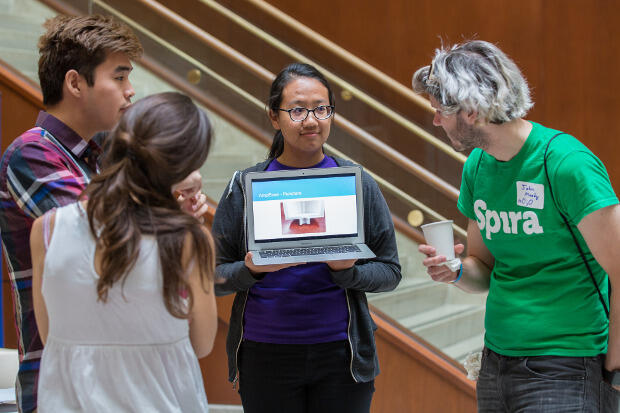
Oct. 12, 2016
VCU’s first HealthHacks provides numerous solutions to everyday patient care
Share this story
Students from Virginia Commonwealth University and other universities gathered Oct. 1-2 to develop solutions for unmet medical needs at VCU’s first medical hackathon, HealthHacks. A hackathon is a 24-hour, intense period of innovation during which teams work collaboratively to solve computer science-related problems. A medical hackathon is similar in structure to a traditional hackathon, but focused on solving unmet medical needs presented by medical and affiliated professionals. The 170 attendees formed 35 teams with more than 20 engineering and medical mentors available for consults on the projects.
“HealthHacks@VCU began with ‘problem – opportunity’ statements presented on addressing unmet clinical needs,” said L. Franklin Bost, director of the VCU Institute for Engineering and Medicine and executive associate dean of the VCU School of Engineering, which hosted the event alongside the VCU School of Medicine. “The event demonstrated that many viable solutions could be conceived and prototyped in a very short time by a focused team of dedicated individualsmany viable solutions could be conceived and prototyped in a very short time by a focused team of dedicated individuals.”
Sina Mostaghimi, a fourth-year VCU School of Medicine student, and Simone Gregor, a senior biomedical engineering student and Honors College member, brought the HealthHacks concept to VCU. Fellow students Mashya Abbassi, Michael Pasyk and Nadia Mostaghimi spent countless hours volunteering to make the event a success.
“Computer science hackathons have been around for a while and have gained popularity, but medical hackathons are new,” Gregor said. “We are excited for VCU to be on the forefront of the medical hackathon movement.”
<slideshow id=148 align=center width=620>
Technology and supplies available at the event included 3-D printers, modeling clay and a variety of computer software. In addition to VCU physicians, faculty and staff, industry leaders from fields including medical device manufacturing and product design provided support and guidance.
“The industry sponsors for HealthHacks were critical to providing event support and in mentoring the project teams,” Bost said, adding that future medical hackathons could include the Schools of Dentistry, Pharmacy, Nursing and Allied Heath and many schools on the Monroe Park Campus.
Thirty-three teams presented their solution concepts. The first-place team developed a system to translate 2-D computerized topography scan images into 3-D visuals that can be viewed on a phone as well as a virtual reality headset. The visulals can aid physicians and patients understand disease progression and potential surgical procedures.
The second-place team completely overhauled how a critical two-stage medication is rapidly administered through a syringe. The third-place team targeted monitoring of patients with tremors. They designed a new wearable watch, which monitors tremors over time to see if the patients’ medication is effective.
“Teams can carry their ideas forward by engaging academic, government and nonprofit sources of developmental funding,” Bost said. “We often think of solving the ‘big’ problems in health care. However, there are numerous everyday patient care needs that should be addressed by focused teams of motivated individuals.”
“The biggest achievement in my opinion of HealthHacks is getting so many students together, working in interdisciplinary teams to solve medical problems,” Mostaghimi said. “Students that worked in these interdisciplinary teams were the ones that won, which was great to see. I think the most fun that I got out of it was working as a mentor to all of the teams using my medical and engineering background, as well as getting to meet 170 new people. I was also really excited to see big shot physicians and industry leaders help students develop some awesome projects.”
HealthHacks was hosted in the VCU School of Engineering and made possible by a large number of dedicated staff and faculty from the schools of Engineering and Medicine.
Subscribe to VCU News
Subscribe to VCU News at newsletter.vcu.edu and receive a selection of stories, videos, photos, news clips and event listings in your inbox.













